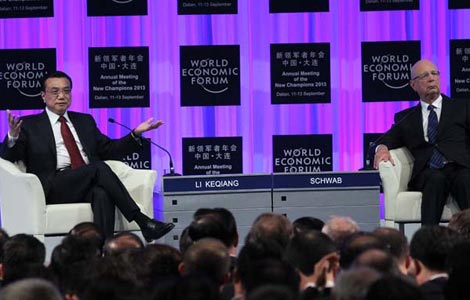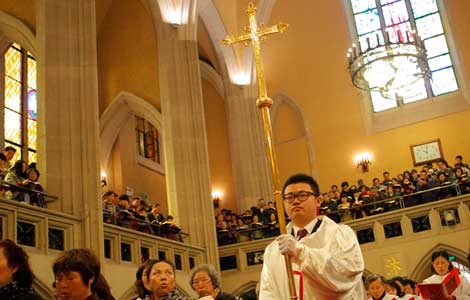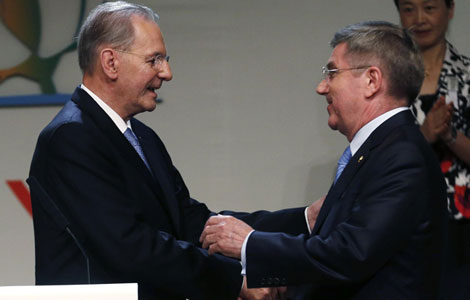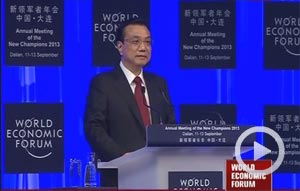Shanghai FTZ tests China's currency liberalization
Updated: 2013-09-12 19:07
(Xinhua)
|
||||||||
SHANGHAI -- Among a cluster of warehouses located on the outskirts of Shanghai, China is set to experiment one of its most significant reforms since Shenzhen freed the country's trade 33 years ago -- how China should liberalize its currency.
The world's second largest economy announced it would build a free trade zone on the shore of the East China Sea. The zone will be a test bed for pushing forward full convertibility of the Chinese yuan and the opening of financial services.
As China's economy has showed signs of stabilizing during the last two months, economic transitions and reforms are again becoming the focus of attention.
Chinese Premier Li Keqiang said at Summer Davos Forum on Wednesday that China's modernization will not be accomplished without reform, nor will it be achieved without opening-up, citing Shanghai FTZ as one of the new ways to open the country wider to the outside world.
"The FTZ will act as a stress test. We are going to explore to what extent can China open its capital account," said a person with direct knowledge of the issue.
According to Shanghai Securities News, a financial newspaper owned by Xinhua, the general plan of the zone will possibly be published by the end of this week.
"It's a landmark event in China's drive of deepening economic reforms," said Citi Bank senior economist Ding Shuang. "The Shanghai FTZ demonstrates China's commitment to reforms before key reform packages are to be discussed in the third plenary session of 18th CPC central committee."
Tear down the wall
Among all the reform measures, opening the capital account is the most debated.
China re-started to free its currency exchange rate in 2005, and since then the Chinese yuan has appreciated over 30 percent against the U.S. dollar. But to buffer China from international financial turmoil, the country's capital account remains closed, a rule in existence for decades.
Exchanges between the Chinese yuan and foreign currencies are regulated with strict quota allocation and transactions are scrutinized. Every Chinese person is only allowed to buy up to $50,000 each year.
The regulators, however, now believe tearing down the currency wall will do more good than harm. Opening the capital account will improve financial transparency and efficiency as well as spur China's drive of building Shanghai into a world financial hub.
China's cabinet pledged in May to map out "operational" plans to make the Chinese yuan convertible under the capital account. Shanghai FTZ is considered the first place to carry out the plan.
"It's difficult to segregate the Shanghai FTZ from the rest of China. There will be money flows underground. It can be said that the FTZ experiment opens a hole in China's capital account wall," said Wang Tao, chief China economist at UBS.
"It's technically possible to completely segregate the FTZ from the rest of China, but that will be unnecessary. If China completely segregates the FTZ, there will be no meaning for building such a test bed," Ding said. "But unlimited opening is also unlikely. The regulators may adopt quota regulation."

 Another iPhone4 explodes while charging
Another iPhone4 explodes while charging
 Premier stresses transformation of the economy
Premier stresses transformation of the economy
 Soyuz capsule returns from space station
Soyuz capsule returns from space station
 China's Christian churches reduce leaders' age ceiling
China's Christian churches reduce leaders' age ceiling
 Student's rare blood bonds Kazakhstan and China
Student's rare blood bonds Kazakhstan and China
 Apple's low-end phone price disappointing
Apple's low-end phone price disappointing
 US marks 9/11 anniversary
US marks 9/11 anniversary
 German Bach elected as IOC president
German Bach elected as IOC president
Most Viewed
Editor's Picks

|

|

|

|

|

|
Today's Top News
Can China withstand global funds shifts?
China Daily Asia Weekly wins media award
Report questions US firms pursuing cloud computing in China
Reducing poverty gains momentum in Asia
China turns to US sorghum for animal feed
China's global firms face 'trust gap'
Li stresses transformation of economy
US delivers weapons to Syrian rebels
US Weekly

|

|






